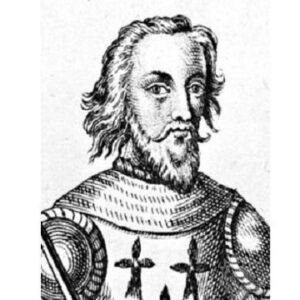In 1341, Charles I, also known as Charles of Blois Chatillon, claimed the title of Duke of Brittany. He is best remembered today for his role in the Breton War of Succession, which lasted more than two decades. Charles was a religious and spiritually inclined child, born to Guy de Chatillon and Margaret of Valois. His religious zeal was so strong that he suffered excruciating pain and discomfort to the point of self-crushing. His devotion earned him a reputation as a pious and devout soul. After the death of John III, Duke of Brittany, Charles married Joanna of Penthievre, an heiress and niece of the Duke of Brittany. However, John of Montfort refused to acknowledge his claims, resulting in confrontation and the start of the Bretton War of Succession. The Bretton War of Succession lasted twenty years, culminating in Charles’ death at the Battle of Auray in 1364 and the Montforts’ victory. Charles was canonized as a Saint after his death, but this sanctification was nullified due to opposition from his successor, Duke of Brittany, John V. In 1904, however, he was bestowed the title of ‘Blessed.’
Childhood and Adolescence
Guy I of Blois-Chatillon, Count of Blois, and Margaret of Valois had Charles of Blois-Chatillon circa 1319. His mother was King Philip VI’s sister.
Charles has been a devout Catholic since he was a child. His faith in God was so deep that it later proved useful in instilling loyalty and dedication among his warriors.
Charles went to great lengths to convey his fervent adoration. To stay close to God, he would put pebbles in his shoes and tie ropes underneath his garments to keep himself continually uncomfortable. Furthermore, he confessed his sins every night so that he might sleep soundly.
The Later Years
Charles married Joanna of Penthievre in 1337. She was the heiress and niece of John III, Duke of Brittany. The marriage essentially consisted of an agreement to join a political and military alliance.
Charles usurped the title of Duke of Brittany from the House of Penthievre after John III’s death in 1341. However, his uncle, John de Montfort, refused to acknowledge his claim to the dukedom.
Following John de Montfort’s rejection, Charles sought to handle the matter amicably between the two by engaging in friendly conversations with him. The Breton War of Succession began as a result of John’s conservatism and lack of flexibility.
During the twenty-year Breton War of Succession, Charles sought the backing of the French peerage to be acknowledged as the sole successor to the duchy, while John enlisted the help of Edward III.
Charles conquered Nantes in 1341 and imprisoned John for four years. In 1343, Pope Clement VI intervened and negotiated a peace with Edward III, preventing him from assaulting Nantes.
The truce had no effect on Charles and John, who continued the Breton succession battle. Despite being a devout Christian, Charles ordered the slaughter of 2000 citizens following the siege of Quimper.
Charles was apprehended in La Roche-Derrien in 1347 and imprisoned in the Tower of London. After nine years in prison, he agreed to hold Brittany under Edward’s vassalage in exchange for a substantial payment.
Following his release from captivity, Charles resumed his struggle with the Montforts. On July 12, 1363, he promised to divide Brittany with Duke John IV of Brittany, but his wife, Joanne, convinced him to breach the treaty. The move backfired when Charles was murdered
by the Montforts at the Battle of Auray in 1364, while his army was beaten.
Following his death and loss at the Battle of Auray, the Montforts won the Breton War of Succession and were given the title of Duke of Brittany.
Personal History and Legacy
Joanna of Penthievre, the heiress and niece of Duke John III, married Charles I. John (Jean) I of Châtillon, Guy, Henri, Marie, and Marguerite were the couple’s five children.
On September 29, 1364, during the Battle of Auray, Charles died. With the triumph of the Montforts, the fight also signaled the end of the Breton War of Succession.
Charles was canonized as a Saint of the Roman Catholic Church after his death. On the request of his successor, Duke John V of Brittany, one of Charles’ opponents, Pope Gregory XI annulled his canonization.
Charles I was beatified in 1904, and the title of Blessed Charles of Blois was bestowed upon him. On September 30, the church proclaimed his Roman Catholic Feast Day. This day is commemorated every year on his feast day.
Estimated Net Worth
Estimated net worth of Charles I, Duke of Brittany is unknown.
Trivia
This Duke of Brittany was so pious that he required his soldiers to attend Holy Mass on a daily basis. ‘We can afford to lose castles, but we cannot go a day without attending Holy Mass,’ he is said to have told his warriors.


